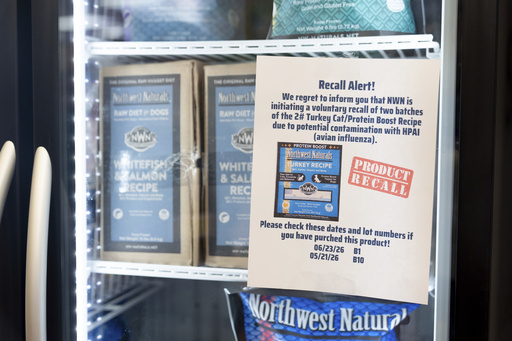The recent death of a house cat in Oregon, along with a pet food recall, has sparked concerns regarding the ongoing bird flu outbreak and the potential risks to pets.
Bird flu, which has been affecting wild birds and various domesticated animals such as chickens and turkeys for years, was first identified in U.S. dairy cattle this past March. The virus has prompted occasional but mostly mild cases of illness among people in the U.S., primarily affecting those who work on poultry or dairy farms. To control the spread of the virus, health officials mandate the culling of every bird on a farm when the virus is detected.
In this instance, health officials in Oregon linked the cat’s illness to frozen cat food containing raw turkey. Testing confirmed that the virus found in both the recalled food and the cat was identical. Dr. Michael Q. Bailey, the incoming president of the American Veterinary Medical Association, cautioned that feeding pets raw meat can pose significant health risks, and even result in death. He stressed that cooking meat or pasteurizing raw milk effectively eliminates the bird flu virus and other pathogens.
Regarding the risk of bird flu to pets, though infections are rare, cats appear to be particularly vulnerable to the H5N1 subtype of the virus. Even prior to the outbreak in cattle, there were cases of feline infections linked to contact with wild birds and poultry. Since March, numerous cats, including domesticated, feral, and big cats in captivity, have contracted the virus. The Los Angeles County Department of Public Health is currently investigating the deaths of four house cats believed to have consumed recalled raw milk. While dogs seem somewhat more resistant to the virus, they should also be fed only thoroughly cooked food to ensure their safety.
To protect cats from bird flu, it is recommended that they avoid consuming unpasteurized dairy products or raw meat, and that pet owners keep them away from wild birds and farm animals. Cat owners are advised not to let their pets roam freely outdoors, as cats are instinctive hunters and may easily encounter birds. Additionally, it is important to practice good hygiene by avoiding direct contact with sick or deceased birds and thoroughly cleaning hands after handling poultry or animals.
Symptoms of bird flu in cats can include a lack of appetite, lethargy, and fever. A noticeable change in behavior, such as a normally active cat becoming inactive or hiding, should raise alarms for pet owners. Other symptoms may include redness or inflamed eyes, discharge from the eyes or nose, breathing difficulties, and even seizures. If a cat shows these signs, it’s crucial to contact a veterinarian and keep the pet away from individuals with weakened immune systems.
What sparked the recall was Northwest Naturals, a pet food manufacturer based in Portland, Oregon, which voluntarily recalled one batch of its 2-pound Feline Turkey Recipe raw frozen pet food following positive virus tests. This product had been distributed across several states including Arizona, California, Colorado, Florida, Georgia, Illinois, Maryland, Michigan, Minnesota, Pennsylvania, Rhode Island, Wisconsin, and also in British Columbia, Canada. The affected food carries “best if used by” dates of May 21, 2026, and June 23, 2026. Consumers possessing this pet food should dispose of it and seek refunds from the retailer where it was purchased.



